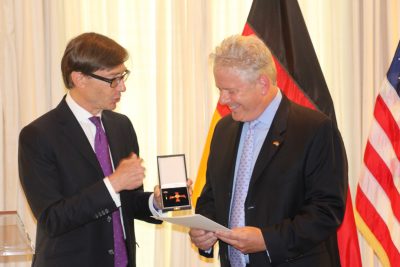Jeffrey Anderson Receives Officer's Cross from the President of Germany

July 12, 2016
by Caroline Kenneally
On July 11, SFS Professor Jeffrey Anderson was honored with the Officer’s Cross of the Order of Merit of the Federal Republic of Germany. This award recognizes Anderson’s contributions to German-American and transatlantic exchange in academia and education, and is Germany’s only federal civilian decoration. Throughout his career, Anderson has worked to enhance Germany’s standing abroad through his study of the European Union and postwar German politics and foreign policy.
Anderson reflects, “I think I now have an inkling of what it must be like for the captain of a national soccer team to lift the FIFA World Cup trophy at the end of the competition. It's a great personal honor, but it would not have been possible without an amazing team effort.”
Anderson is the Graf Goltz Professor & Director of the BMW Center for German and European Studies (CGES) in Georgetown University’s Walsh School of Foreign Service. Since coming to Georgetown in 2002, Anderson has built CGES into one of America’s foremost educational institutions on Europe and Germany. “The BMW Center is constructed around a two-year masters program, and the achievements of this talented group of faculty, staff, students, and alumni are what make me proud about receiving the Officer’s Cross,” Anderson says.
CGES was founded in 1990 with a grant from the German government and the mission to educate the next generation of transatlantic leaders. “The first generation – 25 years after the center’s founding – is now out of the chutes and already exerting a positive influence on the world around us. We’re now turning our attention to the next generation,” notes Anderson.
The two-year Master of Arts in German and European Studies (MAGES) program offers a well-rounded approach to studying Europe. Students in the MAGES program are given the opportunity to engage with the other research centers within the SFS. “No other school of international affairs is constructed quite like the SFS,” Anderson explains, “CGES is surrounded by seven other centers within the SFS, which house professional masters programs covering a full range of regional and functional areas of inquiry in international affairs. The resulting positive synergies make for a truly unique environment and we’re fortunate to be a contributing part of that environment.”
Anderson refers to the MAGES curriculum as a “power triangle.” Students explore the relationship of Europe and the U.S. as two focal points, in addition to a third focal point outside this transatlantic foundation. This third area of study can range from an additional country or region to a current problem or challenge. Anderson explains that this provides MAGES students with the opportunity to connect their foundation in European studies to other parts of the world and targeted topics of specialization. Additionally, current MAGES students benefit from a highly engaged alumni network, which Anderson considers “an invaluable asset,” as well as the Center’s continuing and productive relationship with the German government.
Anderson’s interest in Europe was ignited at a young age. He recalls, “I had unique experiences at a very impressionable age…that left me always curious about Europe.” Born in 1959, Anderson spent four out of his first ten years living in Europe. His father—a theoretical physicist—took the family twice on two-year stays abroad: the first in Trieste, Italy, in 1966-67, and the second in Warsaw, Poland in 1968-69. Anderson’s memories from that time spent living abroad include a role carrying the communist flag for his Polish elementary school in the May Day Parade in 1968.
His deep interest in Germany came much later. During graduate school in the 1980s, an advisor suggested that Anderson learn German in order to incorporate Germany into his dissertation project. “Best advice I ever received,” he emphasizes, “no one could have predicted German unification a few years later, but I was well positioned to take advantage of it.” As Germany was an economic and political success during the 1980s, very few political scientists were taking an interest in the country’s politics, resulting in a shortage of German experts in the field.
Anderson’s area of study has taken center stage recently due to the Brexit decision in the U.K. as well as questions regarding the future of the European Union. “It’s always fresh,” he describes, “unexpected developments in the world around us that demand analysis and response means I’m never bored.”
Amidst a changing world, Anderson is pleased to see a consistent spirit of inquiry and camaraderie among the faculty and student body. “That sort of thing doesn’t happen by accident, and it doesn’t happen because the director wills it. It’s a team effort, which produces a unique environment.” Anderson credits his experience teaching Georgetown students as the most rewarding part of his past fourteen years as CGES Director.
They're inquisitive, they're focused, and they want to do something meaningful with their education. What more could you ask for as a professor?

